413.6 Scrub Seal Treatment
The scrub seal is a process by which an anionic charged polymer modified asphalt agent is applied to an asphalt pavement surface and scrubbed into the cracks and voids with a broom. A small layer of aggregate is then applied over the asphalt and then broomed once again, forcing the mix into the cracks and voids to form a seal. The seal is then rolled with a pneumatic tire roller. Since scrub seal is meant to be used as a preventive maintenance measure, its primary purpose is to fill cracks and seal an asphalt pavement.
Scrub sealing is less expensive per mile than a 1 in. hot mix overlay, chip seal, and microsurfacing. This process helps to prevent light deterioration, retard progressive failures, and reduce routine maintenance service activities. The traveled way can be opened to traffic about two (2) hours after application.
Scrub sealing should be used only on pavements with ADT less than 7,500 and of sound condition. This process should be used only on stable pavements that are dry, oxidized, and cracked, since it is not intended to improve the structural condition of the pavement.
413.6.1 Maintenance Planning Guideline
| Code: R31C |
Definition
The time and expenses incurred for spot or continuous seals using either hand or bar application of bituminous material and covering with aggregate material either by hand, tailgate or spreader. This includes course aggregate chip seals & fine aggregate chip seals.
Purpose
To seal out surface moisture on cracked or deteriorating asphaltic surfaces, extend pavement life, and improve skid resistance.
Scheduling
When temperatures are 65° F and rising.
Recommended Equipment
- Truck Distributor
- Chip Spreader
- Optional Brooms
- Rubber Tire Roller
- Trucks
- Optional Pilot Truck
- Traffic Control Equipment (See Traffic Control for Field Operations)
Recommended Material
- Liquid Binder – Sealing Grades
Check with Materials Office for selection of aggregate size (3/16 in. or less).
- Sand – Other Blot Material
Recommended Procedure
1. Place traffic control devices as needed.
2. Sweep the existing surface to clean and remove loose debris.
3. Set temporary pavement marking.
4. Apply asphalt at recommended rate and broom as necessary.
5. Cover asphalt with blotting material.
6. Broom blotting material.
7. Roll with rubber tire roller.
8. Remove traffic control devices, except "Fresh Oil" and "No Center Stripe" signs, and open to traffic.
9. "Fresh Oil" and "Loose Gravel" signs should remain in place until surface is cured and loose aggregate has been thoroughly swept off.
Safety
Wear all appropriate PPE. Refer to Safety Policies, Rules & Regulations-Employee Handbook.
Other Considerations
Clean up excess material with power broom.
References
Standard Specification Sec 413.20 and Sec 1015 and
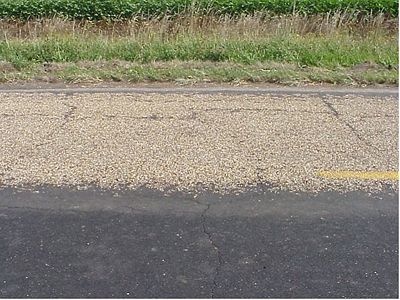 |
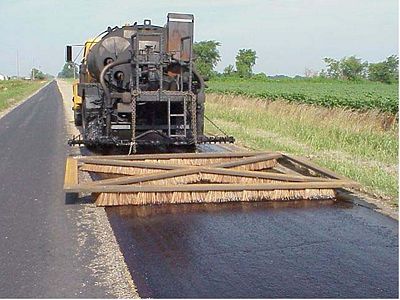
|
| Roadway Prior to Scrub Seal | Scrubbing the Oil into the Roadway |
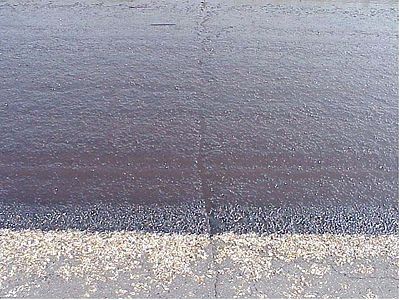 |
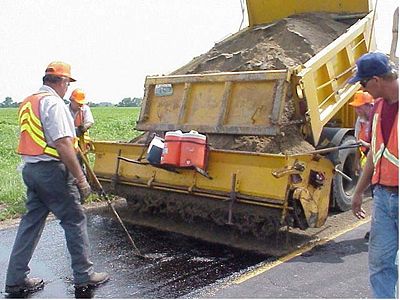
|
| Oil Penetrates and Seals Cracks | Applying the Sand |
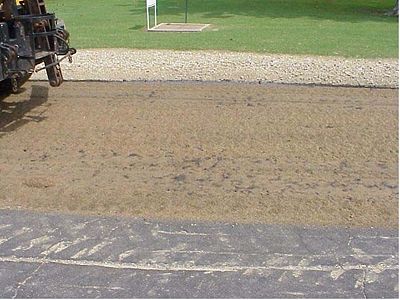 |
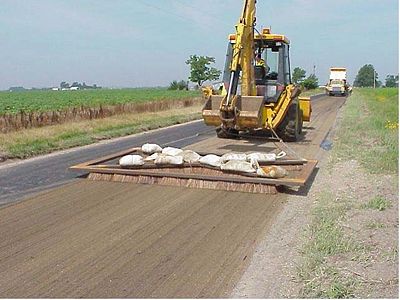
|
| Sand Applied Prior to Scrubbing | Scrubbing the Sand |